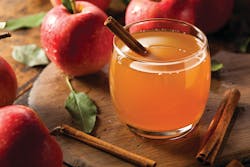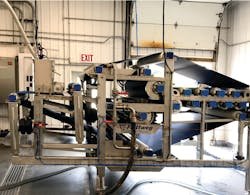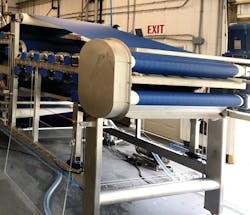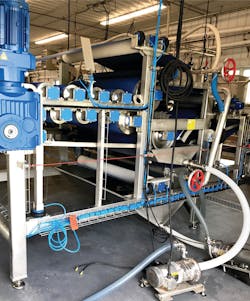Case Study: Belt press increases production for apple cider company
Minard Farms Beverage Company Inc. is a fifth generation, family-owned and operated, 320-acre cider mill located in the heart of apple country in the Hudson Valley in Clintondale, New York. Minard Farms presses its cider from a blend of tree-ripened, hand-picked apples and never uses fruit that has fallen on the ground. Each pressing happens on-site at the orchard and is made from a carefully selected blend of apples that ensures a consistently high-quality flavor, sweetness and color. Minard Farms flash-pasteurizes or UV-treats its cider, depending on customer needs.
Minard Farms cider contains less than 1/20th of 1% of potassium sorbate as preservative and has an eight-week code. It is Kosher-certified (Vaad Hakashrus of Crown Heights) and licensed in New York and Connecticut. In addition, it is HACCP (Hazard Analysis Critical Control Point)-certified and has had an HACCP plan in place 1 year prior to the U.S. Food and Drug Administration (FDA) requirement to ensure safety.
Producing a little less than 1 million gallons per year, the cider is packaged in the facility and used for two primary purposes. One is fresh product that is packaged in gallon, half-gallon and pint-sized packages. The other side of the business is the fermentation side — used for hard cider with some sort of distillation process that is shipped out to the tanker straight from the press.
The challenge
The business was previously using a traditional means of pressing apples.
“Our machine happened to be a horizontal machine that you fill with mash,” said Fred DeMaio, Minard Farms Beverage Company’s vice president. “It was a batch process. It required a lot of labor at the end of each cycle to shake the bags out to get the mash out of the bag. The machine we had in place was good for about 1,000 gallons an hour.”
The machine was huge and required significant manpower to operate it — usually four men per shift. It also required about four man-hours to clean the equipment after every shift.
“At the end of any 8- to 10-hour day, they were all dead tired,” DeMaio said. “The press took up a big portion of the room. It was made of carbon and steel and fit into the food production environment. A lot of farmers have used that kind of press through the years.”
The solution
DeMaio researched new technologies and discovered the Flottweg belt press.
“It was very easy to do some simple math on a belt plate press where the process is continuous,” he said. “I began investigating technologies. There are probably three or four belt presses that main manufacturers are using. Flottweg has the longest history and the most success stories, whether they are filtering juice out of fruit or solids out of sewage, Flottweg has the best technology and the best support. We found this out quickly.”DeMaio said that Flottweg’s price was not the least expensive option, but after further discussions and massaging a few details, the price became attractive when compared to the value — the manpower and ease-of-use savings.
“What was even more attractive was the depth of the company,” he said. “Their service and knowledge are so good. Their guys really explained the ins and outs of belt presses.”
During the first year of using the Flottweg belt press, Minard Farms increased its yield by three times and lowered its manpower by 50%, recovering the cost of the belt press with the savings realized within the first 12 months, DeMaio said.
“With this new technology, we have one guy managing the press and one guy managing the flow of the apples,” DeMaio explained. “One guy can actually observe the process to make sure the equipment is operating properly. Now, it’s really a nonphysical type of environment. At the end of the cycle, these guys have plenty of energy left for the cleanup, which now only takes two hours instead of four. This is good for morale, and it’s good for production. We are still producing 1,000 gallons an hour, but at the end of this cycle, everyone is happy. With the old technology, employee retention was low and the morale was low.”
DeMaio said there is also an aesthetic value to the press.
“It’s easier to clean because it’s all stainless steel,” he said. “When we made the change, we removed all the carbon steel from the process. Because the Flottweg press is stainless and shiny, the guys want to take care of it more because it just looks better. We’ve been through two seasons now and the guys are actually proud to work in there.”An additional advantage is a built-in clean in place (CIP) feature. “We can hook the cleaning room to the press, so it runs and cleans pretty much on its own,” DeMaio said. “With the old press, there was no CIP ability at all. Those machines had to be hand-cleaned and hand-sanitized. Because it was so big, the brushing in the nooks and crannies of the old press was very laborious and required a lot of thought, a lot of effort, and a lot of work. It was a struggle to keep that press clean. The new Flottweg press is clean and shiny all the time.”
The apples are pressed and mashed, and the liquid is separated from the skin and seeds. After extracting the liquid, the rest of the material is transferred to a dump truck and then recycled into beef cattle feed.
How it works
The Flottweg belt press is suitable for various applications in mechanical separation technology, including manufacturing of fruit juice (direct juice), concentrate and vegetable juice, as well as dewatering of brewer's grains, algae extract, coffee grounds, herb extracts, soya, starch and additional applications in the areas of foodstuffs, chemicals and pharmaceuticals.The pulp is continuously and evenly spread over the bottom belt. Then, the top belt is guided onto the product. This ensures that the surface pressure increases evenly and that a stable pulp product cake is formed.
In the press area, dewatering takes place via an L-profiled roller, which ensures the liquid flows out quickly. Following this, the pulp is pressed out via press rollers with reducing roller diameters. The increasing pressure load extracts the juice from the pulp optimally and quickly.
Optional linear press rollers and edge zone pressure rollers increase the effectiveness of the belt press further. In this way, a juice yield in excess of 90% can be achieved in two-stage operation. For stable continuous operation, high-pressure nozzles clean both belts continuously after the pomace has been removed.
Advantages of the Flottweg belt press include:
- Continuous and reliable operating method with minimum operating complexity
- Consistent use of stainless steel for a high hygienic standard
- Good resilience and durability
- Clear design and easy access for cleaning, operation and maintenance
- Efficiency and good yield
- Automatic belt control for optimum tension and guidance of the belts
The results
Minard Farms completed its second full year of using the Flottweg equipment. “We haven’t had any problems,” DeMaio said. “We’ve had a few challenges, but challenges are just the nature of the beast. The Flottweg tech team in Kentucky is easily reachable and is quick to help us fix them. We have made a couple of other improvements, and for those improvements we also used Flottweg equipment. They really helped me think about what else we needed so we could get the right kind of equipment.”
DeMaio said the equipment is greased on a regular basis, but otherwise, it requires little maintenance. The machine also has safety features.
“When all is in place, we have virtually nothing to worry about,” he said. “The belt is retractable, and if it gets too far off track for whatever reason, there is a feature that shuts the belt down. With the old belt technology, the belts could trip and wreck themselves, and there was nothing you could do about it except place a man there to watch it. This gives us even more savings just to not have a man sitting there babysitting the belt.”
The electrical and control portions were easy to install, DeMaio said, and the installation was accomplished in house.
“The documentation that came with it was over-detailed, which was another nice feature,” DeMaio said.
The apple cider business is seasonal. September through December is the busy season, and the Minard Farms belt press operates on 10-hour shifts every day except Sunday. During the off-season, it runs two to three days a week and occasionally four days a week with eight-hour shifts. With the new Flottweg technology in place, the apple cider company has room for growth.
“This press probably has a capability of about 4 million gallons a year, so we are only touching about a fourth of its capacity,” DeMaio said. “We could run a second shift if necessary and still have men who actually wanted to work on that end of the plant. There is no doubt about its durability and ability to handle additional capacity.”
Jon Kingston has 40 years of experience in the food and beverage processing industry and with separation technology. He can be reached at [email protected].



